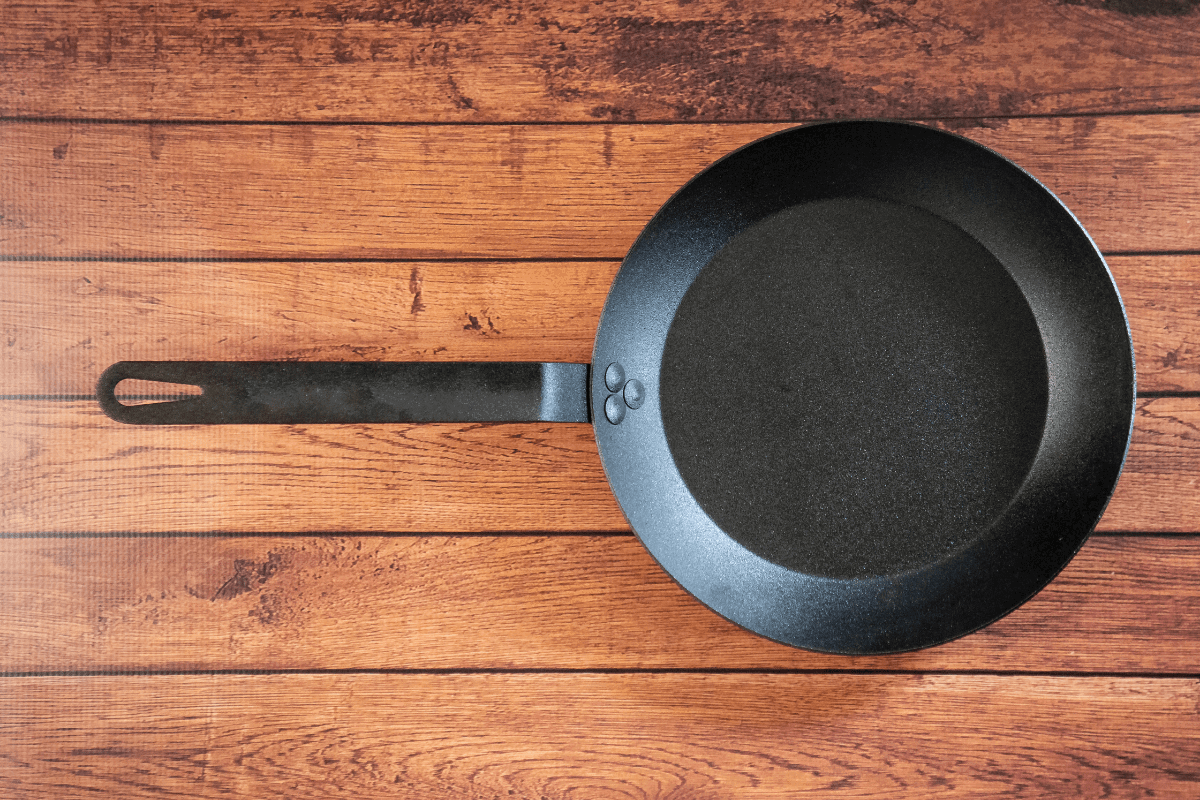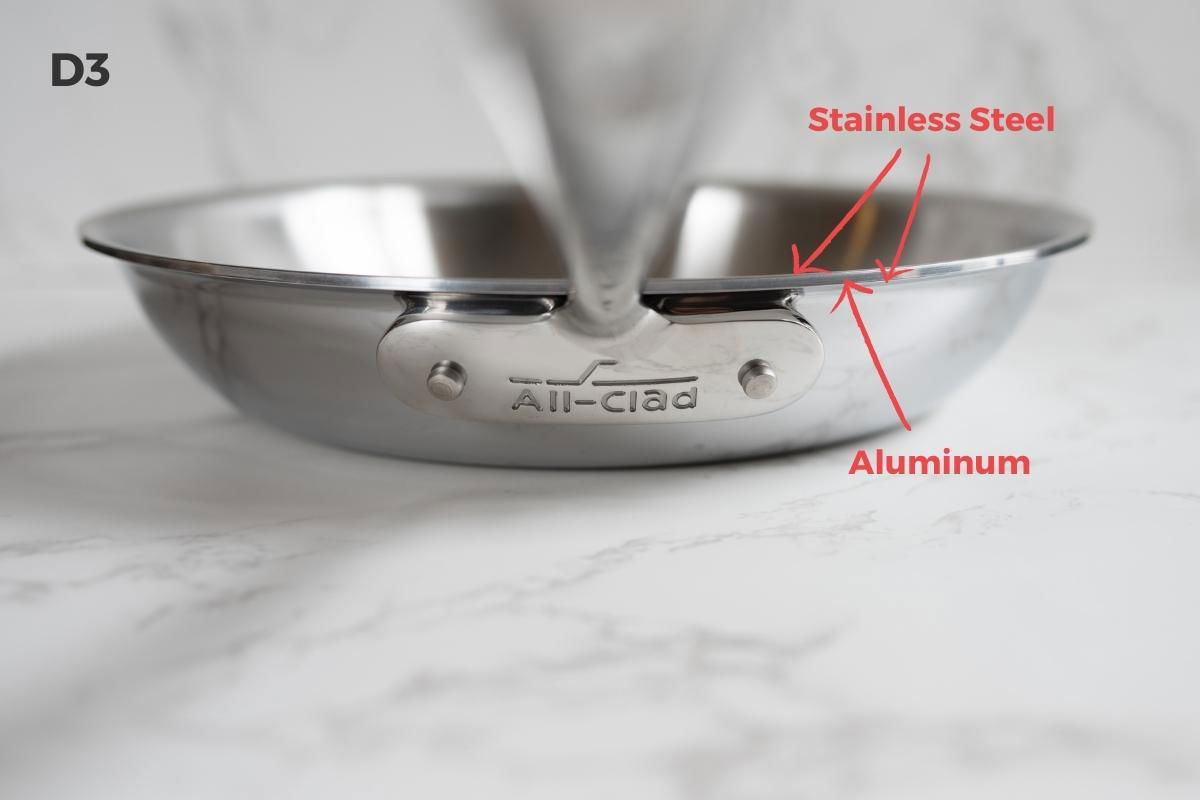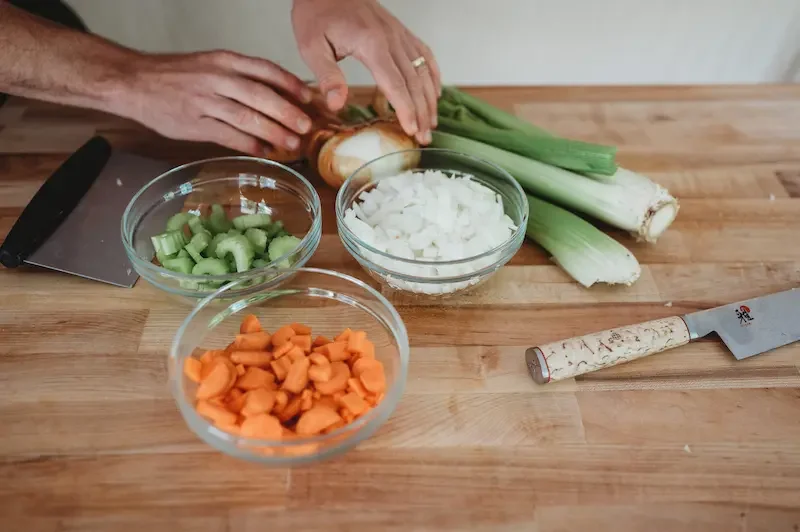Balsamic Vinegar is like the red wine of vinegar.
Aged in wooden barrels, balsamic vinegar is known for its complex, rich, and dark fruity notes. With moderate tartness and noticeable smokiness, it has a distinct flavor that at first seems impossible to replicate.
However, by building off the basic foundations of the balsamic flavor profile: vinegary acid + deep fruity notes (+ optional smokiness), you can easily whip up a balsamic vinegar substitute for a fraction of the cost. No one will be the wiser.
In this article, I’ll walk you through 6 different combinations that perfectly substitute for balsamic vinegar.
Along the way, you’ll also learn a little-known formula that will empower you to come up with your own substitute with whatever ingredients you have on hand.
In This Article
6 Great Balsamic Vinegar Substitutions
1. Red Wine Vinegar + Grape Jelly + Soy Sauce

Red wine vinegar, grape jelly, and soy sauce admittedly sounds like an out-there combination at first glance. But, this seemingly wacky combination makes a lot of sense when broken down into parts.
Red wine vinegar is made from grapes and aged in barrels like balsamic, so the flavor properties are already pretty close.
The grape jelly adds a sweet, sugary aspect missing in red wine vinegar.
Soy sauce rounds out the whole combination and adds an umami smokiness.
Altogether, these ingredients create a compelling balsamic vinegar substitute.
I prefer to use this combination when cooking savory dishes, like balsamic chicken or balsamic brussels sprouts and bacon.
For every 1 tablespoon of balsamic vinegar, you can substitute ¾ tablespoon of red wine vinegar, 1 teaspoon of grape jelly, and ½ teaspoon of soy sauce.
2. Red Wine Vinegar + Maple Syrup

Red wine vinegar and maple syrup are the perfect balsamic vinegar substitution for all your dessert-making or balsamic glaze needs.
This substitute swaps at a 1:1 ratio with balsamic vinegar, using 1 part maple syrup and 4 parts red wine vinegar to create your substitution.
We’ve already discussed how red wine vinegar is similar to balsamic vinegar. Now, pair that with the deep and complex flavor of maple syrup, and you will end up with a result very close to balsamic.

Pro-Tip: If you are going for a thicker consistency, reminiscent of a balsamic glaze to drizzle on top of tomatoes and mozzarella or a strawberry tart, opt for 1 part maple syrup to 2 parts red wine vinegar.
3. Apple Cider Vinegar + Sugar

Apple cider vinegar and sugar are two common ingredients that you may already have in your pantry.
This is the best option for salad dressings. The flavor of apple cider vinegar paired with plain sugar creates a light and versatile flavor that pairs well with whatever kind of dressing or sauce you are making.
To substitute one tablespoon of balsamic vinegar, swap for 1 tablespoon of apple cider vinegar and ½ tablespoon of sugar.

Pro-Tip: If you have apple cider vinegar that includes “the mother,” the sediment that settles at the bottom of the bottle, make sure the shake it up and then combine your sugar and mix until the sugar dissolves. This way, your substitute will incorporate into your recipe without fail.
4. Fruit Vinegar + Brown Sugar

This combo pairs an alternative vinegar and sugar to create a balsamic vinegar substitute.
Fruit vinegar casts the fruity (yet tart) acidic note we are after. Brown sugar brings the rich sugar note.
Plum vinegar pairs well with marinating red meat, citrus or strawberry vinegar is perfect for use in salad dressings, and raspberry vinegar can work for both applications.
To replace 1 tablespoon of balsamic vinegar, mix and add 1 tablespoon of fruit vinegar and ½ tablespoon of brown sugar.

Pro-Tip: All out of brown sugar? Make your own. For every cup of plain white sugar, add 1 tablespoon of molasses.
5. Soy Sauce + Lemon Juice + Date Syrup

Soy sauce is full of umami flavor, lemon juice is tart with an acidic bite, and date syrup is rich, thick, and sweet. Mixing all of these together will create a convincing alternative to balsamic vinegar.
I like using this mixture for marinating meat because the lemon juice tenderizes the protein to achieve a fall-apart, mouth-watering, and highly flavorful dish.
Since date syrup has a viscosity to it that is comparable to balsamic glaze, you can also use this combination to drizzle on top of finished dishes.
Try swapping the date syrup for molasses if you need an even thicker consistency.
For 2 tablespoons of balsamic vinegar, substitute 1 tablespoon each of soy sauce, lemon juice, and date syrup.

Pro-Tip: If you don’t have date syrup on hand, molasses, brown sugar syrup, or brown rice syrup will work also.
6. Balsamic Vinaigrette

Balsamic vinaigrette is the simplest ingredient that you can use as substitution for balsamic vinegar, being that it is a mixture of balsamic vinegar and olive oil.
This substitution will work across the board no matter what dish you make.
Swap these with a 1:1 ratio; use the same amount of balsamic vinaigrette as balsamic vinegar that the recipe calls for.
You will end up with a bit of extra olive oil in your dish, but this will not alter the consistency and, if anything, will just create even more richness of flavor in your meal.
Tips for Working with Balsamic Vinegar Substitutes
It is important to thoroughly mix your balsamic vinegar substitution before adding it to your recipe. The goal is to completely incorporate whatever sugar you choose into whatever acid you’re using, then continue with your recipe.
If you find that you have some of these ingredients on hand but not the correct combinations to make the substitutions listed above, you can create your own.
Begin with an acid, then incorporate a form of sugar, and you will achieve the balance of tart to sweet that balsamic vinegar is known for.
Acids can be red wine vinegar, apple cider vinegar, fruit vinegar, rice vinegar, or Worcestershire sauce. You can even try soy sauce or coconut aminos with lemon juice in place of the acid.
Sugars can be granulated white sugar, brown sugar, maple or date syrup, honey, molasses, or even grape jelly.

Pro-Tip: If the combination you create lacks the smoky depth that balsamic offers, try adding a drop of liquid smoke to round out the flavor. Stubbs is the kind I always keep on hand.
FAQs
Can I use regular vinegar in place of balsamic vinegar?
If you just want to swap one vinegar for another, stick with complex flavor profiles similar to balsamic vinegar: Chinese black vinegar, red wine vinegar, or rice vinegar.
Can I use Worchestershire sauce in place of balsamic vinegar?
Yes, Worchestershire sauce is an excellent substitution for balsamic vinegar, especially if you combine it with a sugar like date syrup to replicate the complex flavor of balsamic.
What is the difference between balsamic vinegar and red wine vinegar?
Both kinds of vinegar are made from grapes and aged in barrels; red wine vinegar is just younger than balsamic. Balsamic vinegar uses the grapes, stems, and seeds, and is aged passed the wine stage in vinegar making.







